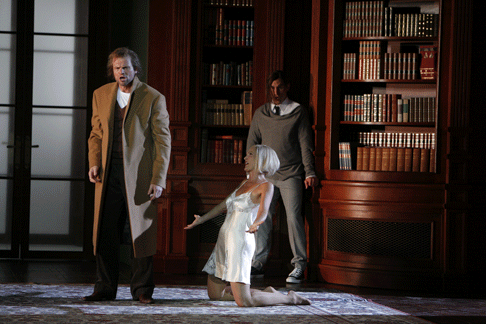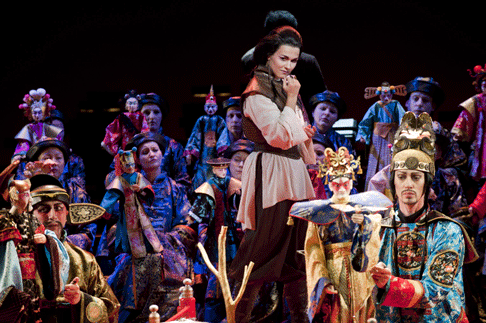At least based on the Don Giovanni, Alceste and Rossignol that opened within the first three days of the festival (July 1 – 21).
The logistics of opening three shows within three days are daunting. Both the Giovanni and the Alceste are new productions, alternating performances in the Festival’s signature ArchevÍchÈ theater. Meanwhile Le Rossignol from Canadian Opera had been installed in the Grand ThÈ‚tre de Provence. Later in the month the Stravinsky gives way to Rameau’s Pygmalion arriving direct from the Holland and Athens Festivals. Not to mention yet another theater comes into action within the Festival’s first week — the countryside Grand St. Jean (grand meaning a kind of barn, Jean pronounced john) with a Festival commission, Oscar Strasnoy’s new chamber opera Un Retour El Regresso.
The means of the Aix Festival obviously exceed those of any ordinary opera house with its three theaters and its large number of resident ensembles (the Freiburg Baroque Orchestra, English Voices, orchestra and chorus of the OpÈra de Lyon, the William Christie Ensemble, Ensemble Musicatreize plus the Aix Festival’s AcadÈmie europÈenne de musique) and a nearly 20 millions euros budget for its twenty-one day duration!
The cat’s whisker of North American opera these days is Canadian Robert Lepage. While we wait for his massive Ring at the Met we can be entertained by his reasonably modest production of Stravinsky’s Le Rossignol put together with a potpourri of other Stravinsky fables. Though how modest can it be to banish the orchestra to the stage by filling the pit with water (making the pit a lake, river or swimming pool is hardly a new idea, but to this point it has been metaphor rather than fact).
Nor is the Stravinsky orchestra modest. Rossignol stands with Firebird, Petruska and Rite of Spring as the Stravinsky theater works for very large orchestra (triple winds with extensive doubles plus much additional percussion, double harp). Rossignol is trapped by its too simple story and its simplistic moralism within Stravinsky’s burgeoning musical and orchestral language that simultaneously with this pale fable bursts into the primal motives and rhythms of the ballets. But in Rossignol this expanding language is relegated to portraying an exoticism of locale and nature subordinated to the tedious procedures of ritualistic storytelling.
Trapped onstage without an acoustic shell and hidden behind the seated chorus the Opera de Lyon orchestra provided a beautiful if muted account of Stravinsky’s colorful score, carefully driven by conductor Kazushi Ono. The Rossignol was Olga Peretyatko, a veteran of the original Toronto production. Aggressively sung to be sure, this nightingale’s Rossini bravura matched the aggressive orientalisme and puppetry insisted upon by the Lepage production. The spectacle style staging though succeeded only sporadically in alleviating the inherent boredom of the score.
 Scene from Don Giovanni
Scene from Don Giovanni
Waste deep in the pit lake Lithuanian tenor Edgaras Montvidas gave a brilliant performance as the fisherman while deftly operating his puppet double, well seconded by his other semi-submerged Russian speaking colleagues, notably the Chinese emperor of Ilya Bannik. The singing was intensely lyrical in its Russianness, implacably spurned on by Maestro Ono.
You can’t make a silk purse out of a sow’s ear, though this was an amusing if exaggerated attempt.
Much more successful were the other simple fables for ensemble voices and various combinations of instruments in smaller ensembles. These pieces not even meant to be staged were delightfully performed by broadly smiling peasant Russians. The tales were enacted by black and white shadow puppetry in various techniques with Cirque de Soleil virtuosity. The juxtaposition of Stravinsky’s early strident minimalism with the more abstract forms of puppetry was perfection.
Christoph Gluck’s opera Alceste was staged by the witty German director Christof Loy who chose to tease the audience by magnifying the severity of Gluck’s reform style. Adding to the austerity of the evening Mr. Loy allowed us no break between Acts I and II thus we sat two long hours before regrouping (most of us) to witness Alceste’s reprieve from death only to learn that we all are going to die anyway.
Mr. Loy reduced Euripides tragedy from its larger political terms to a purely family tragedy (the untimely death of a father). Euripides’ Thessalians became modern children holding toys. A black suited, clerically collared priest to Apollo physically abused one of these children (arousing an angry protest from someone in the audience on July 6). Jupiter was an expansive uncle who came to visit.
Yes, there was dance. The chorus of children moved to carefully designed stage positions during the dance interludes. The set was a white room, its side wall a huge window, its angled back wall broken by a small proscenium type opening that usually revealed mom and dad’s bedroom (this was a carefully created child’s world).
Yes, there was spectacle — this opening became an attic where mementos of past lives are cast off and forgotten, like Hades, the netherworld. This vision became alive as these colorful spirits of the past flowed out onto the stage to taunt Admete and Alceste. The finale of the opera was in fact quite magnificent spectacle — the doors of this stage within a stage opened on an absolute black void. Nothing. It was a vast vision of death, a concept and a reality. Huge. Everyone wound up entering.
Alceste was Mr. Loy’s metaphor of human destiny that even children understand.
Gluck’s reform operas give the chorus and orchestra huge dramatic responsibilities. Mr. Loy’s staging exacerbated these responsibilities, and miraculously they were met by English Voices, a chorus of 32 young singers who sang with magnificent Baroque gusto and seemed quite at home acting like six-year-olds, and by the Freiburg Baroque Orchestra conducted by Ivor Bolton. Mo. Bolton elicited bold sounds from this prestigious group, its bassoons and double basses especially called upon to instill shock and awe.
Alas, just knowing Maria Callas sang Alceste places any other soprano who attempts the role in impossible competition. The Aix Festival entrusted the role to French early music soprano Veronique Gens who exuded artistry far more than passion. Canadian tenor Joseph Kaiser in fact melded his artistry into powerful Gluckian humanity, notable indeed when he reacted to Alceste’s sacrificial intentions to save his life.
 Scene from Le Rossignol (The Nightingale)
Scene from Le Rossignol (The Nightingale)
This Alceste was close to musical perfection with careful period performances by principal singers, chorus and orchestra. The production now moves on to Royal Danish Opera and the Vienna State Opera where perhaps it will lose some of this carefulness and hopefully attain a dramatic reality unfettered by performance practice.
Russian stage director Dimitri Tcherniakov knows we all know Don Giovanni pretty well, maybe too well. The Aix Festival knows its audience loves Mozart and so there is always plenty of it (there are 10 performances of this Giovanni). One of the recent Giovanni ‘s served up in Aix was by British director Peter Brooks who experimented with Mozart’s masterpiece by turning its singers loose on stage to figure it out for themselves — it is not hard to imagine how successful that was.
Mr. Tcherniakov did not even try to figure it out. In fact he did everything he could to confuse the opera’s issues. First he informed us that Giovanni and Elvira are married and that Zerlina is Donna Anna’s daughter. Leperello is some relative who happens to be in the Commedatore’s house, and Masetto and Don Ottavio are various fiances who end up kissing each other.
Not that he re-wrote the script. It was still the same old familiar words, never mind that it made no sense. Though a curtain crashed onto a silent stage from time to time to inform us of a quite precise but totally arbitrary time line (un jour plus tard, trois jour plus tard, deux mois plus tard, etc.).
Mr. Tcherniakov ignored the mysteries of the Don Juan complex by making the Don Giovanni a drunken bum no one could possibly love. The mystery therefore was why the three women in the story love him. Not that much was explained except that Donna Anna loves sex and was not getting much of it from Don Ottavio, Zerlina was obsessed by sex and was not getting much of it from Masetto. Elvira was cold and did not seem to want much sex.
Thus, and this is maybe Mr. Tcherniakov’s point (if there could possibly have been one), we might hear Mozart’s Don Giovanni for the first time! That, maybe, we did indeed.
French conductor Louis LangrÈe took on the resources of the Freiburg Baroque Orchestra to magnificent result. Right-on tempi, certainly on the fast side, that took advantage of the agility of the early instruments, with the raspy sound of these more primitive versions of modern instruments used to implement attack and immediacy. These unfamiliar sounds made this familiar score come brilliantly alive. It was new music.
Plus Mozart’s score was accorded extraordinary relief with Mr. Tcherniakov’s play with silence. The curtain rose before the overture, and fell well before the overture was completed forcing our attention again onto sound. Action within the unit set (a room in the Commendatore’s comfortable haute bourgeoise house) was interrupted between numbers by the crashing curtain and minutes of silence. Each time begun again the music gained vibrancy.
Of many momentous moments several stand out. The Don’s, Danish baritone Bo Skovhus, serenade was a drunken reverie moving in his aloneness; Slutty Donna Anna’s, German soprano Marlis Petersen, account of her rape was her rape of Don Ottavio; Zerlina, Swedish soprano Kerstin Avemo, turned her Batti, batti into a sex fantasy with the Don (accompanied by a weird cello obligato); Elvira, Latvian soprano Kristine Opolais, was leaden of aspect when passed by the Don to the very physical Leporello of American bass-baritone Kyle Ketelsen; Don Ottavio, Canadian tenor Colin Balzer, kissed Masetto, Serbian/Israeli David Bizic.
You get the idea. The Aix Festival scoured the earth to get just the right people to upset Mozart with quite brilliant performances of his own music.
Well, bravo Aix, bravissimo! The trip has been worthwhile. So far.
Michael Milenski
image=http://www.operatoday.com/Alceste-acte-2.2.gif
image_description=Scene from Alceste [Photo by Pascal Victor / Artcomart courtesy of Festival d’Aix-en-Provence]
product=yes
product_title=Don Giovanni, Alceste and Le Rossignol
product_by=Festival d’Aix-en-Provence 2010
Click here for cast information.
product_id=Above: Scene from Alceste
All photos by Pascal Victor / Artcomart courtesy of Festival d’Aix-en-Provence